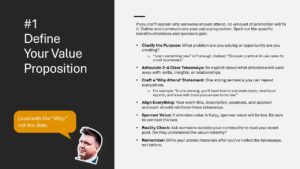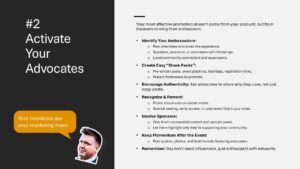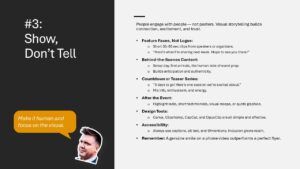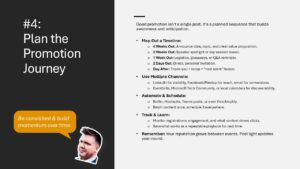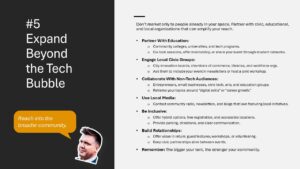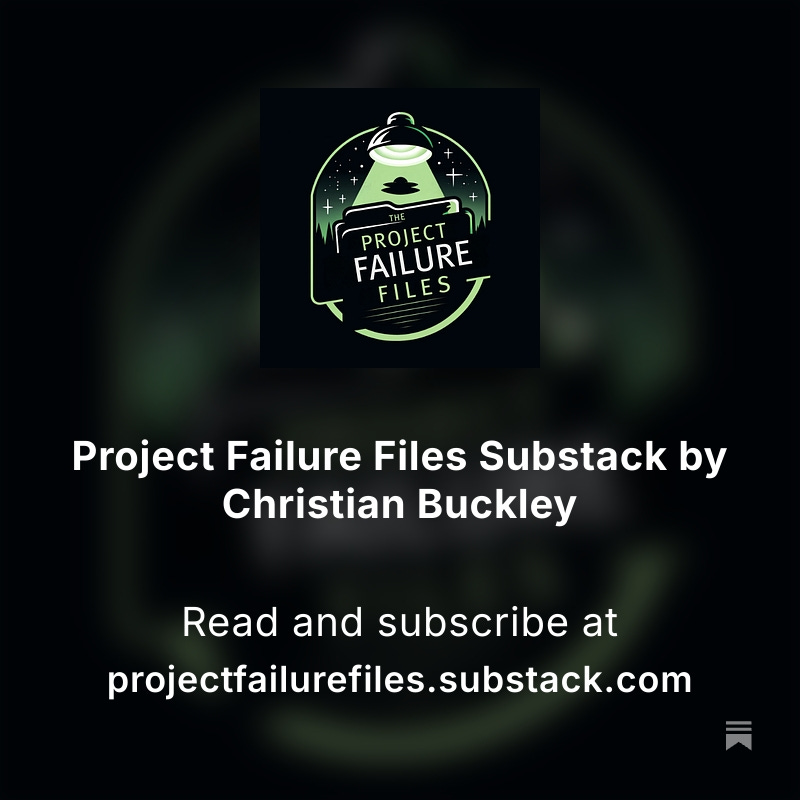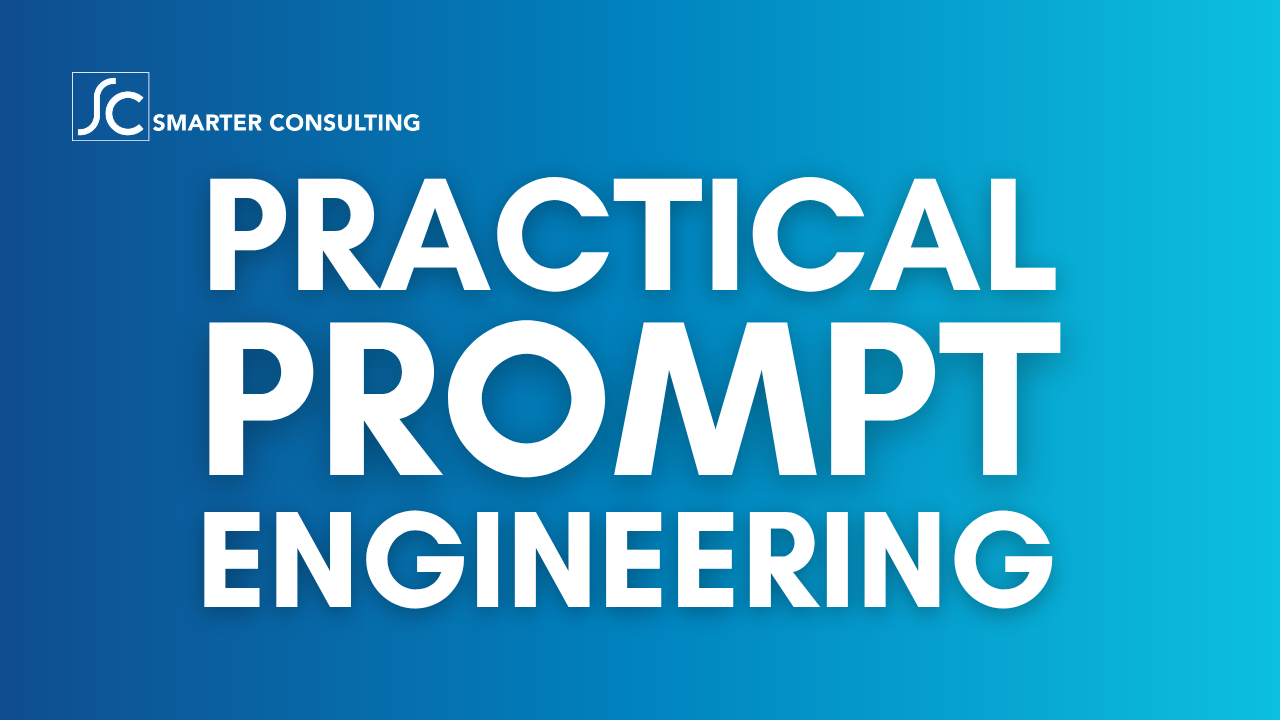5 Proven Ways to Promote Your Community Events
Earlier today, I had the opportunity to present at the Microsoft Global Community Initiative (MGCI) monthly gathering. This is a meeting of community organizers who, like myself, help drive user groups, meetups, and regional events that support the broader Microsoft ecosystem.
This community is filled with passionate, experienced people doing incredible work, often behind the scenes. I’ve been part of it for years, helping organize dozens of events across the U.S., including leading SharePoint Saturday Redmond on the Microsoft campus for seven years, and SharePoint Saturday Utah for a decade before relocating to Texas. I also helped start, lead, and support events in Sacramento, East Bay (San Ramon, CA), Silicon Valley, Los Angeles, Phoenix, Portland, Bend (Oregon), British Columbia, and Honolulu. I’ve seen what works, what falls flat, and where even the most well-intentioned events struggle.
During the MGCI session, I was asked to share some practical insights on event promotion, specifically around marketing and social media. With limited time to speak, I focused on what I consider the five most common weak spots in community event promotion. These aren’t abstract theories. They’re field-tested tactics I’ve learned from years of organizing, promoting, and sometimes failing publicly (so you don’t have to).
If you want your events to grow, reach new people, and actually get the attendance your content deserves, these five strategies will make a real difference.
 1. Nail Your Value Proposition First
1. Nail Your Value Proposition First
Before you post a single update, answer this: Why should someone attend?
If your answer is vague—like “it’ll be a great time” or “you might learn something”—that’s not enough. People are busy. To cut through the noise, you need a clear, specific value proposition.
- What problem are you solving? Frame your event as the solution. Instead of “Learn about AI,” try “Discover 3 ways small businesses are using AI to save time and cut costs.”
- List 3–4 concrete takeaways. Skills they’ll gain, tools they’ll walk away with, people they’ll meet.
- Write a one-line ‘Why Attend’ statement and use it everywhere. Think: “In one evening, you’ll learn how to automate tasks, meet local experts, and leave with tools you can use tomorrow.”
Don’t wing it. Build your promotional materials after you’ve clarified the value—never before.
 2. Turn Enthusiasts Into Advocates
2. Turn Enthusiasts Into Advocates
Your community is your marketing team. Instead of relying solely on your official accounts, activate the people who already believe in what you’re doing.
- Identify your ambassadors. Past attendees, engaged volunteers, local connectors—these are your front line.
- Equip them with share-ready content. Make it easy: pre-written posts, images, hashtags, and registration links.
- Encourage real stories. Ask them to share why the event matters to them personally—not just copy-paste a flyer.
- Show appreciation. Public shout-outs, VIP access, or simple thank-you notes go a long way.
Sponsors can help too. Give them co-branded content and encourage them to share why they’re involved.
Remember, you don’t need influencers. You need people who care—and have networks.
 3. Show, Don’t Just Tell
3. Show, Don’t Just Tell
Words alone won’t cut it. Visual storytelling builds connection, excitement, and trust.
People want to see other people—faces, not logos.
- Short video clips: Have speakers or organizers share a quick message: “Here’s what I’m covering next week. Hope to see you there!”
- Behind-the-scenes content: Show the messy, real prep. The setup. The nerves. The first arrivals. It humanizes your event.
- Countdowns and teasers: A quick “3 days to go—don’t miss this session!” post creates urgency and buzz.
- After the event: Use highlight reels, testimonials, quote graphics. Let attendees help tell the story.
Tools like Canva, CapCut, and Clipchamp make this easy. Just keep it authentic—raw phone video with a smile often beats a polished flyer.
 4. Plan the Promotion Like a Journey
4. Plan the Promotion Like a Journey
A one-and-done social post won’t move the needle. You need a planned, staged promotional timeline that builds over time.
Here’s a simple roadmap:
- 4 weeks out: Announce the date, topic, and value.
- 2 weeks out: Feature a speaker or session.
- 1 week out: Share key logistics and any giveaways.
- 2 days out: Send personal reminders or last-chance invites.
- Day after: Post a thank-you, highlights, and tease your next event.
Use different channels for different goals:
- LinkedIn = visibility
- Facebook or Meetup = reach
- Email = conversions
- Eventbrite or community calendars = discovery
Batch your content and schedule it using tools like Buffer or Hootsuite. And after each event, track what worked—then repeat.
Consistency matters. The work between events builds your reputation and momentum.
 5. Step Outside the Tech Bubble
5. Step Outside the Tech Bubble
If you’re only promoting within your existing circles, you’re limiting your reach. To grow, connect beyond your usual crowd.
- Partner with schools. Colleges and tech programs are hungry for real-world connections. Offer workshops or mentorship in exchange for promotion.
- Engage local civic groups. Chambers of commerce, libraries, city boards—many are looking for community-driven content to share.
- Reframe your messaging for broader audiences. Instead of “Microsoft 365 Governance,” pitch it as “Digital tools for small business growth.”
- Tap into local media. Community blogs, newsletters, and radio stations love local success stories and events.
Also, make your event easy to attend:
- Offer hybrid options.
- Keep registration free or low-cost.
- Provide clear directions, parking info, and accessibility options.
And remember: partnerships work both ways. Stay involved with civic and educational groups year-round, not just when you need promotion.
Final Thoughts
Promoting community events isn’t about shouting louder—it’s about communicating smarter. Be clear about your value, engage your people, tell human stories, plan with purpose, and expand your reach. Do that, and you won’t just fill seats—you’ll build a community that sticks around.

